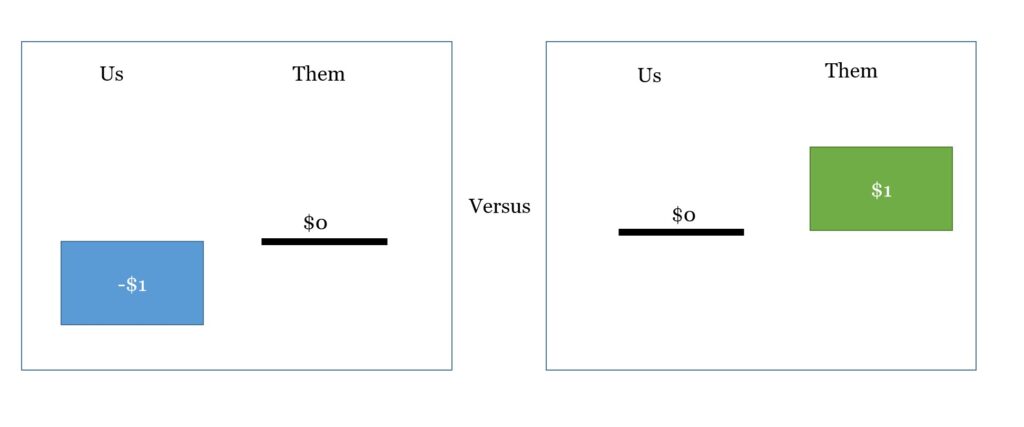The fact that we form groups, alliances even, is fundamental human behavior. Working together allows us to achieve things that we couldn’t do independently. Sadly, almost inevitably, being in a group brings conflict with other groups. Much work is done on how we react to group-based conflict. What do we know about whether we are more interested in not aiding an opposing group, rather than benefitting our own group?
We Lose, You Win
Consider a common occurrence, there are two groups with opposing aims. Rachel Gershon and Ariel Fridman looked at situations where the decision-maker is in such a scenario. There has been a decent amount of work (see Tajfel) on who we are biased towards given group-based identities when there is a reward we can give. Unsurprisingly, we often show a preference for our own group. A slightly different challenge comes when a person can harm another group they are opposed to. We can also show a desire to hurt the other group.
Gershon and Fridman looked at yet another possibility. This was where the decision-maker needed to decide between hurting their own group or aiding an opposing group. (Rather confusingly they call these lose-lose scenarios. This is even though the opposition group can gain. In saying lose-lose they are taking the decision-maker’s perspective. The opposing group making a gain is a loss for the decision-maker).

Efficiency In Harming
The authors looked at political conflicts. They used experiments where participants could decide on fund allocation. Would participants prefer to take a dollar from their own side, rather than give a dollar to the other side of a hot-button issue? For example, the issues they tested in the US were abortion and guns. In many ways, the obvious solution is to consider who would make the best use of the dollar. If you are confident that your side can achieve more with a dollar than the opposition can it is better to give the opposition a dollar rather than take a dollar from your side. Taking it from your own side would set your cause back more than giving a dollar to the opposition.
Indeed, people did think their own side would use the money better. (Likely thinking that the messages the participants agreed with would prove compelling if only more people heard them). Despite thinking that their own side would spend it better people still preferred taking money from their own side than giving it to the other side. This wasn’t close. Participants were willing to take a lot from their own side to avoid the opposition getting a little.
..on average participants required almost $4 to be subtracted from the donation going to their organization, to be indifferent towards adding $1 to the opposing organization.
Gershon and Fridman (2022) page 5
The authors even found that stronger attitudes, e.g., strongly pro-choice or pro-life attitudes, meant that the participants were willing to punish their own side more to avoid giving anything to the side. The more die-hard supporters were the more they made decisions that were more likely to hurt their own side. (This is especially true if their own side really could use the money better as the participants generally believed.)
Not Aiding An Opposing Group
This seemed to come down to the participants having an identity that involved not aiding an opposing group. This might imply we want to think of ourselves as anti-the-opposition more than pro-our-own-side. This is a little worrying for the state of group-based conflicts. People may be so caught up in not helping the other side that they ignore the need to not hurt their own side. This could get pretty destructive, pretty quickly. The various sides of an issue willingly undermine their own causes to ensure they don’t help the opposition even a little. This can descend quickly into zero-sum thinking. No deal that truly benefits our side is possible if it even gives a little ground to the opposition.
Generalizing
This is interesting work and makes sense. As ever with this type of research, we hit questions about generalization. It seems eminently plausible to me that sometimes we foolishly undermine our own side to avoid the feeling of helping the enemy. I believe this happens. That said, I also believe sometimes people will be clear-eyed and work out that helping the opposition is fine as long as it avoids (greater) harm to their own side. It is hard to imagine how an experiment could show the prevalence of the various approaches in the real world. We would really need to get to real-world data (which, to be fair, likely doesn’t exist.)
Even if they can’t get to real-world prevalence experimental approaches can certainly help us. They allow us to see what can happen. This helps illustrate how group-based conflict can create significant problems for society. It is always worth asking, am I hurting my own side more than I must simply to stop the other side?
For more on how we deal with other groups see here, here, and here.
Read: Rachel Gershon and Ariel Fridman (2022) Individuals prefer to harm their own group rather than help an opposing group, PNAS. Psychological And Cognitive Sciences, 119(49)
